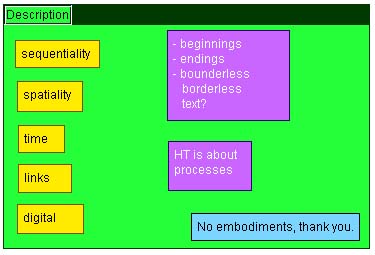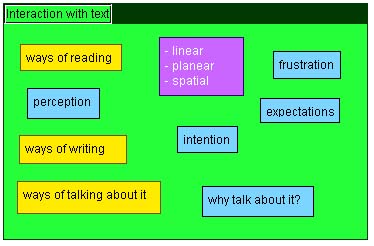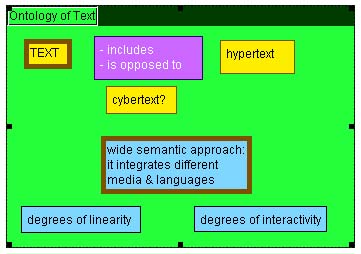
HT2000 Writer's Workshop
Talk About Writing
The Talk About Writing session happened twice in the HT2000 Writer's Workshop, with about 30 participants altogether. The position statement paper previous to the conference can be found at https://archive.the-next.eliterature.org/htww/susana1.htm.
This session was aimed at discussing the position of literary theory within the hypertext field, questioning old approaches and trying to come up with new ideas and ways to look at hypertext from the humanities field. The attendees engaged in a lively discussion that brought up many interesting topics. One main concern was the need for a deep revision of the field from the theoretical point of view, since most people are still quoting the works that were written in the late eighties and early nineties, when things were very different. The worldwide explosion of the Internet has made things both easier and more difficult for the hypertext community. We should somehow integrate the WWW in our approaches, stop describing imaginary hypertexts and start looking for practical descriptions.
This is an explanation of the notes taken during the two Talk About Writing meetings, illustrated with screenshots from VKB (Visual Knowledge Builder), that was used to organize the different ideas into a coherent (I hope) schema. As a starting point, we proposed that the attendees try to agree on a description (not a definition) of "hypertext"; from there on, the discussion easily progressed towards other topics of interest, such as the ontology of text, the quality of both writers's and users's interaction with hypertextual structures, and the problems that arise when trying to teach hypertext in the classroom.

Some of the keywords describing hypertext were:

The "text" still seems to be a rather elusive object, whose often unstable status is further undermined by the necessity to include hypertext in its definition. As a general cathegory, "text" is very useful, and both sessions took a pragmatic approach understanding text in the broad semiotic sense, so that it's an encompassing cathegory that can integrate different media and languages.
People were more interested in discussing characteristics than absolute terms. For example, the category "cybertext" (Aarseth) came up as a way of questioning assumptions when trying to define textuality.
How useful is the term "hypertext"? The participants identified different point of views/definitions of hypertext as:
There seems to be some confusion here, or maybe we don't need a unifying approach...

There isn't still a fixed terminology to talk about hypertext (this was suggested by some participants to be positive). Our vocabulary is "fuzzy". However, it's clear that there are different possibilities of interaction with the (hyper)text. The attendees made an effort at proposing categories to characterize perception and reading. Perception could be either linear, planear or spatial, depending on our level of engagement with the text. Here we talked a lot about Jane Douglas's paper on "Engagement, Immersion and Flow", and also about Bolter's ideas of "looking at" and "looking through" the text. Not to forget when talking about hypertext's reading processes is the dreaded phrase that kept on coming up: frustration of expectations.
At this point, the most radical people started wondering why do we have to talk about hypertext at all, and specially if our interests as a group were homogeneous. Most people gave one or more of the following answers:

Finally, it was quite clear that the teaching issues were of such central importance, that they probably deserve a workhop of their own. Lecturers complained that it was very difficult to get students interested or enthusiastic about hypertext: they mostly don't understand the theory, or are frustrated by the lack of relationship between the existing theory and the hypertexts they see after reading it. We managed to put a few recommendations together for teachers of hypertext:
We also realized we should start paying more attention to tools and systems, and try to bring something to this discussion, instead of limiting ourselves to avant-garde literature only.
So really, this workshop track didn't really manage to produce a list of recommendations, but a list of questions. We are not finished with hypertext, not even near it, so we hope that the discussion goes on next year, as lively as in San Antonio. We also want to thank all the participants and the other organizers, specially Deena Larsen who put everything together. The exchange of ideas will hopefully go on in other contexts, virtual and real.
The Talk About Writing session was conducted by Susana Pajares Tosca and Anja Rau